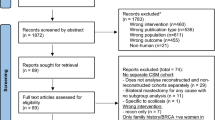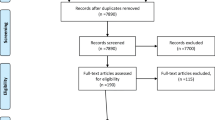Abstract
Purpose
To examine changes in cancer-related knowledge, distress, and decisional conflict from pre- to post-genetic counseling (GC) in before (BDS) and after (ADS) definitive surgery breast cancer (BC) patients.
Methods
Sociodemographic and clinical characteristics were collected at baseline; primary outcome data were collected before (T1) and after (T2) pretest GC. Within group changes for cancer-related knowledge, distress, and decisional conflict over genetic testing were compared by Wilcoxon signed-rank tests.
Results
Of 103 BC patients, 87 were ADS and 16 were BDS. Analyses revealed that both groups reported significant increases in knowledge between T1 and T2 (median change 4.2, p = 0.004, and 2.7, p < 0.001, for BDS and ADS patients, respectively). Overall cancer-related distress showed a downward trend between T1 and T2 for both groups and was significant for BDS patients (p = 0.041). Reports of BDS patients trended toward overall and subscale-specific increases in decisional conflict, with the exception of the uncertainty which trended downward, but did not reach significance. Overall decisional conflict decreased in ADS patients, approaching marginal significance (p = 0.056), with significant improvements in informed decision making (median change −12.6, p < 0.001; i.e., pretest GC yielded improved knowledge of benefits, risks, and side effects of available options).
Conclusions
These pilot data suggest that pretest GC increases cancer-related knowledge for both BDS and ADS patients, decreases distress in BDS patients, and improves informed decision making in ADS patients. Future studies with larger sample sizes are needed to replicate these results.


Similar content being viewed by others
References
Graeser MK, Engel C, Rhiem K, et al. Contralateral breast cancer risk in BRCA1 and BRCA2 mutation carriers. J Clin Oncol. 2009;27:5887–92.
Malone KE, Begg CB, Haile RW, et al. Population-based study of the risk of second primary contralateral breast cancer associated with carrying a mutation in BRCA1 or BRCA2. J Clin Oncol. 2010;28:2404–10.
Metcalfe KA, Lynch HT, Ghadirian P, et al. The risk of ovarian cancer after breast cancer in BRCA1 and BRCA2 carriers. Gynecol Oncol. 2005;96:222–6.
Chen Y, Thompson W, Semenciw R, Mao Y. Epidemiology of contralateral breast cancer. Cancer Epidemiol Biomarkers Prev. 1999;8:855–61.
Brekelmans CT, Tilanus-Linthorst MM, Seynaeve C, et al. Tumour characteristics, survival and prognostic factors of hereditary breast cancer from BRCA2-, BRCA1- and non-BRCA1/2 families as compared to sporadic breast cancer cases. Eur J Cancer. 2007;43:867–76.
Daly M, Axilbund JE, Bryant E, et al. The NCCN genetic/familial high-risk assessment: breast and ovarian clinical practice guideline, version 1.2006. http://www.nccn.org/. Accessed 1 Oct 2006.
Boughey JC, Hoskin TL, Degnim AC, et al. Contralateral prophylactic mastectomy is associated with a survival advantage in high-risk women with a personal history of breast cancer. Ann Surg Oncol. 2010;17:2702–9.
Domchek SM, Friebel TM, Singer CF, et al. Association of risk-reducing surgery in BRCA1 or BRCA2 mutation carriers with cancer risk and mortality. J Am Med Assoc. 2010;304:967–75.
Finch A, Beiner M, Lubinski J, et al. Salpingo-oophorectomy and the risk of ovarian, fallopian tube, and peritoneal cancers in women with a BRCA1 or BRCA2 mutation. J Am Med Assoc. 2006;296:185–92.
Rebbeck TR, Friebel T, Lynch HT, et al. Bilateral prophylactic mastectomy reduces breast cancer risk in BRCA1 and BRCA2 mutation carriers: the PROSE study group. J Clin Oncol. 2004;22:1055–62.
Rebbeck TR, Levin AM, Eisen A, et al. Breast cancer risk after bilateral prophylactic oophorectomy in BRCA1 mutation carriers. J Natl Cancer Inst. 1999;91:1475–9.
Gronwald J, Tung N, Foulkes WD, et al. Tamoxifen and contralateral breast cancer in BRCA1 and BRCA2 carriers: an update. Int J Cancer. 2006;118:2281–4.
King MC, Wieand S, Hale K, et al. Tamoxifen and breast cancer incidence among women with inherited mutations in BRCA1 and BRCA2: national surgical adjuvant breast and bowel project (NSABP-P1) breast cancer prevention trial. J Am Med Assoc. 2001;286:2251–6.
Narod SA, Brunet JS, Ghadirian P, et al. Tamoxifen and risk of contralateral breast cancer in BRCA1 and BRCA2 mutation carriers: a case-control study. Hereditary breast cancer clinical study group. Lancet. 2000;356:1876–81.
Daly M, Axilbund JE, Bryant E, et al. The NCCN genetic/familial high-risk assessment: breast and ovarian clinical practice guideline, version 1.2009. http://www.nccn.org/. Accessed 3 Dec 2009.
Earle CC. Failing to plan is planning to fail: improving the quality of care with survivorship care plans. J Clin Oncol. 2006;24:5112–6.
Hewitt M, Greenfield S, Stovall E. From cancer patient to cancer survivor: lost in transition. Washington, DC: National Academies Press, 2005.
American Society of Clinical Oncology policy statement update: genetic testing for cancer susceptibility. J Clin Oncol. 2003;21:2397–406.
Robson ME, Storm CD, Weitzel J, et al. American society of clinical oncology policy statement update: genetic and genomic testing for cancer susceptibility. J Clin Oncol. 2010;28:893–901.
Berliner JL, Fay AM. Risk assessment and genetic counseling for hereditary breast and ovarian cancer: recommendations of the national society of genetic counselors. J Genet Couns. 2007;16:241–60.
Fraser FC. Genetic counseling. Am J Hum Genet. 1974;26:636–61.
Bernhardt BA, Biesecker BB, Mastromarino CL. Goals, benefits, and outcomes of genetic counseling: client and genetic counselor assessment. Am J Med Genet. 2000;94:189–97.
Shiloh S, Avdor O, Goodman RM. Satisfaction with genetic counseling: dimensions and measurement. Am J Med Genet. 1990;37:522–9.
Pilnick A, Dingwall R. Research directions in genetic counselling: a review of the literature. Patient Educ Couns. 2001;44:95–105.
Braithwaite D, Emery J, Walter F, et al. Psychological impact of genetic counseling for familial cancer: a systematic review and meta-analysis. J Natl Cancer Inst. 2004;96:122–33.
Lerman C, Croyle RT, Tercyak KP, Hamann H. Genetic testing: psychological aspects and implications. J Consult Clin Psychol. 2002;70:784–97.
Meiser B. Psychological impact of genetic testing for cancer susceptibility: an update of the literature. Psychooncology. 2005;14:1060–74.
Hamann HA, Somers TJ, Smith AW, et al. Posttraumatic stress associated with cancer history and BRCA1/2 genetic testing. Psychosom Med. 2005;67:766–72.
Vadaparampil ST, Miree CA, Wilson C, Jacobsen PB. Psychosocial and behavioral impact of genetic counseling and testing. Breast Dis. 2007;27:97–108.
Schlich-Bakker KJ, Warlam-Rodenhuis CC, van Echtelt J, et al. Short term psychological distress in patients actively approached for genetic counselling after diagnosis of breast cancer. Eur J Cancer. 2006;42:2722–8.
Vadaparampil ST, Quinn GP, Brzosowicz J, Miree CA. Experiences of genetic counseling for BRCA1/2 among recently diagnosed breast cancer patients: a qualitative inquiry. J Psychosoc Oncol. 2008;26:33–52.
Geer KP, Ropka ME, Cohn WF, et al. Factors influencing patients’ decisions to decline cancer genetic counseling services. J Genet Couns. 2001;10:25–40.
Nusbaum RH, Peshkin BN, DeMarco TA, Goodenberger M. BRCA 1/2 testing in patients with newly diagnosed breast cancer. Commun Oncol. 2009;6:367–71.
Lerman C, Schwartz MD, Lin TH, et al. The influence of psychological distress on use of genetic testing for cancer risk. J Consult Clin Psychol. 1997;65:414–20.
Lerman C, Narod S, Schulman K, et al. BRCA1 testing in families with hereditary breast–ovarian cancer. A prospective study of patient decision making and outcomes. J Am Med Assoc. 1996;275:1885–92.
Lerman C, Biesecker B, Benkendorf JL, et al. Controlled trial of pretest education approaches to enhance informed decision-making for BRCA1 gene testing. J Natl Cancer Inst. 1997;89:148–57.
Hopwood P, Shenton A, Lalloo F, et al. Risk perception and cancer worry: an exploratory study of the impact of genetic risk counselling in women with a family history of breast cancer. J Med Genet. 2001;38:139.
Horowitz M, Wilner N, Alvarez W. Impact of Event Scale: a measure of subjective stress. Psychosom Med. 1979;41:209–18.
Vadaparampil ST, Ropka ME, Stefanek ME. Measurement of psychological factors associated with genetic testing for hereditary breast, ovarian and colon cancers. Fam Cancer. 2005;4:195–206.
Wevers MR, Ausems MG, Verhoef S, et al. Behavioral and psychosocial effects of rapid genetic counseling and testing in newly diagnosed breast cancer patients: design of a multicenter randomized clinical trial. BMC Cancer. 2011;11:6.
Thewes B, Meiser B, Hickie IB. Psychometric properties of the Impact of Event Scale amongst women at increased risk for hereditary breast cancer. Psychooncology. 2001;10:459–68.
Schwartz MD, Lerman C, Brogan B, et al. Impact of BRCA1/BRCA2 counseling and testing on newly diagnosed breast cancer patients. J Clin Oncol. 2004;22:1823–9.
O’Connor AM. Validation of a decisional conflict scale. Med Decis Making. 1995;15:25–30.
O’Connor AM. User manual—decisional conflict scale. Ottawa: Ottawa Hospital Research Institute, 1993, updated 2010.
Cranney A, O’Connor AM, Jacobsen MJ, et al. Development and pilot testing of a decision aid for postmenopausal women with osteoporosis. Patient Educ Couns. 2002;47:245–55.
Man-Son-Hing M, Laupacis A, O’Connor AM, et al. A patient decision aid regarding antithrombotic therapy for stroke prevention in atrial fibrillation: a randomized controlled trial. J Am Med Assoc. 1999;282:737–43.
Stacey D, DeGrasse C, Johnston L. Addressing the support needs of women at high risk for breast cancer: evidence-based care by advanced practice nurses. Oncol Nurs Forum. 2002;29:E77–84.
Sawka CA, Goel V, Mahut CA, et al. Development of a patient decision aid for choice of surgical treatment for breast cancer. Health Expect. 1998;1:23–36.
O’Connor AM, Tugwell P, Wells GA, et al. A decision aid for women considering hormone therapy after menopause: decision support framework and evaluation. Patient Educ Couns. 1998;33:267–79.
O’Connor AM, Tugwell P, Wells GA, et al. Randomized trial of a portable, self-administered decision aid for postmenopausal women considering long-term preventive hormone therapy. Med Decis Making. 1998;18:295–303.
Trivers KF, Baldwin LM, Miller JW, et al. Reported referral for genetic counseling or BRCA 1/2 testing among United States physicians: a vignette-based study. Cancer. 2011;117:5334–43.
Meyer LA, Anderson ME, Lacour RA, et al. Evaluating women with ovarian cancer for BRCA1 and BRCA2 mutations: missed opportunities. Obstet Gynecol. 2010;115:945–52.
Vadaparampil ST, Quinn GP, Miree CA, et al. Recall of and reactions to a surgeon referral letter for BRCA genetic counseling among high-risk breast cancer patients. Ann Surg Oncol. 2009;16:1973–81.
O’Neill SM, Peters JA, Vogel VG, et al. Referral to cancer genetic counseling: are there stages of readiness? Am J Med Genet C Semin Med Genet. 2006;142C:221–31.
Levy DE, Byfield SD, Comstock CB, et al. Underutilization of BRCA1/2 testing to guide breast cancer treatment: black and Hispanic women particularly at risk. Genet Med. 2011;13:349–55.
Clarke A, Parsons E, Williams A. Outcomes and process in genetic counselling. Clin Genet. 1996;50:462–9.
Bowen DJ, Burke W, McTiernan A, et al. Breast cancer risk counseling improves women’s functioning. Patient Educ Couns. 2004;53:79–86.
Meiser B, Halliday JL. What is the impact of genetic counselling in women at increased risk of developing hereditary breast cancer? A meta-analytic review. Soc Sci Med. 2002;54:1463–70.
Bellcross CA, Kolor K, Goddard KA, et al. Awareness and utilization of BRCA1/2 testing among U.S. primary care physicians. Am J Prev Med. 2011;40:61–6.
Acknowledgment
Supported in part by the American Cancer Society (MRSG CPPB-111062) and the Survey Methods Core Facility at Moffitt Cancer Center.
Author information
Authors and Affiliations
Corresponding author
Rights and permissions
About this article
Cite this article
Christie, J., Quinn, G.P., Malo, T. et al. Cognitive and Psychological Impact of BRCA Genetic Counseling in Before and After Definitive Surgery Breast Cancer Patients. Ann Surg Oncol 19, 4003–4011 (2012). https://doi.org/10.1245/s10434-012-2460-x
Received:
Published:
Issue Date:
DOI: https://doi.org/10.1245/s10434-012-2460-x




